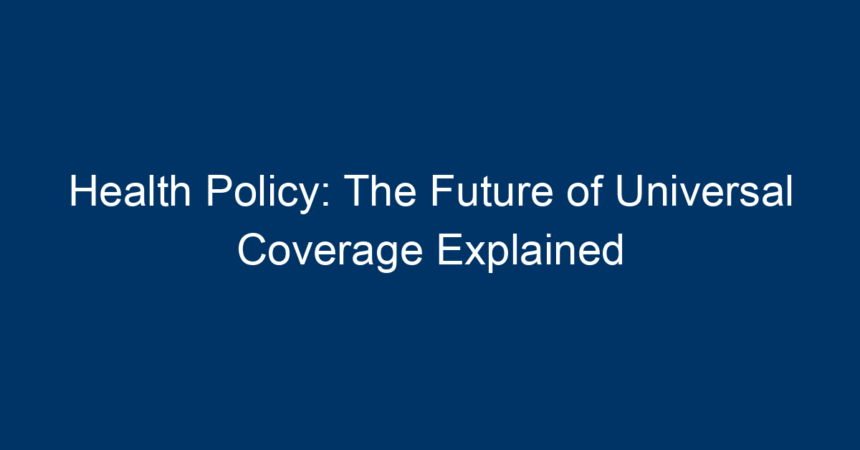As global healthcare systems face unprecedented challenges, the conversation surrounding health policy—a framework guiding decisions about healthcare access and quality—has never been more critical. Universal coverage remains a primary goal for many nations, promising equitable access to necessary health services for all individuals, regardless of their socio-economic status. In this article, we will explore the future of universal coverage through the lens of health policy, examining key trends, challenges, and actionable insights for building a more inclusive healthcare system.
Understanding Health Policy
What is Health Policy?
Health policy refers to decisions, goals, and actions that determine the delivery and organization of healthcare systems. It encompasses various areas, including regulatory measures, financial incentives, healthcare access, and the allocation of resources. Policymakers are tasked with creating strategies that can improve health outcomes while ensuring sustainability and equity.
The Importance of Universal Coverage
Universal health coverage (UHC) is a fundamental principle aimed at ensuring that all individuals receive essential health services without financial hardship. It encompasses a broad range of services, from preventive care to emergency services and chronic disease management. As research indicates, countries with universal coverage often experience better health outcomes and lower overall healthcare costs.
The Current Landscape of Universal Coverage
Global Trends
Over the past decade, several countries have made strides towards universal coverage. For instance, nations such as Canada, the UK, and Sweden have long established healthcare systems that offer comprehensive coverage for their residents. However, substantial gaps remain, especially in low- and middle-income countries where health policy frameworks are still in developmental stages.
According to the World Health Organization (WHO), approximately 1 billion people lack access to essential health services, and 800 million spend at least 10% of their household budget on healthcare. Such disparities underscore the urgent need for effective health policies that prioritize universal coverage.
Challenges in Achieving Universal Coverage
-
Financial Constraints: Many countries struggle with budgetary limitations, affecting their ability to fund comprehensive healthcare programs.
-
Policy Fragmentation: A lack of cohesive health policy can lead to disparities in service availability and accessibility. Fragmented systems are often inefficient, resulting in duplicated efforts and increased costs.
-
Cultural and Social Barriers: Differences in health beliefs, cultural practices, and social determinants of health can hinder the acceptance and effectiveness of health policies aimed at achieving UHC.
- Technological Advancement: While technology can enhance healthcare delivery, the rapid pace of innovation can create disparities if not managed effectively. Disparities in digital literacy further complicate access to computerized health systems.
Future Directions for Health Policy
Innovations in Health Policy
1. Telemedicine
Remote healthcare services have gained attention during the COVID-19 pandemic, showcasing the potential for telemedicine to bridge gaps in access. By leveraging technology, health policy can foster accessibility, allowing patients in rural or underserved areas to receive care without significant travel burdens.
2. Health Equity Initiatives
Policymakers are increasingly recognizing the importance of health equity in shaping effective health policy. Initiatives that address social determinants of health, such as education, income, and environment, can dramatically improve population health outcomes and promote universal coverage.
3. Integrative Care Models
Adopting integrative care models that combine physical, mental, and social care can enhance the patient experience and improve health outcomes. Health policies that encourage collaboration among healthcare providers can facilitate a more holistic approach to patient care.
Sustainable Financing Models
Developing sustainable financing models is essential for the future of health policy and universal coverage. Options include:
-
Progressive Taxation: Tax systems that allocate a higher percentage of income from wealthier individuals to fund health services can promote equity.
-
Public-Private Partnerships: Collaborations between public and private sectors can leverage resources and innovation to enhance healthcare delivery.
- Value-Based Care: Shifting from volume-based care to value-based models ensures that quality and patient outcomes drive payment systems, thereby promoting efficiency.
Actionable Insights for Policymakers
1. Engage Stakeholders
Effective health policy development requires collaboration among various stakeholders, including healthcare providers, patients, and community organizations. Engaging diverse voices can lead to more comprehensive solutions that resonate with the population’s unique needs.
2. Leverage Data and Technology
Utilizing data analytics can offer insights into health system performance, identifying areas for improvement. Policymakers should invest in health information technology to streamline processes, improve access, and enhance patient care.
3. Monitor and Evaluate
Establishing robust monitoring and evaluation frameworks will help policymakers assess the effectiveness of health policies aimed at achieving universal coverage. Regular assessments can inform necessary adjustments to ensure goals are met.
4. Prioritize Education and Awareness
Educating the public about available health services and the importance of preventive care can enhance overall health outcomes. Policymakers should develop campaigns to raise awareness and encourage healthy behaviors.
Conclusion
The future of universal coverage hinges on the evolution of health policy. As nations grapple with the complexities of equitable healthcare access, focusing on innovative models, sustainable financing, and stakeholder engagement will be crucial. By prioritizing health equity and leveraging technology, policymakers can transform healthcare systems into inclusive frameworks that ensure every individual receives the care they need without financial hardship.
As we move forward, individuals can also play a role by advocating for equitable healthcare practices and supporting policies that promote universal coverage. Together, through informed actions and collaborative efforts, we can pave the way for a healthier future where access to care is a right, not a privilege.




